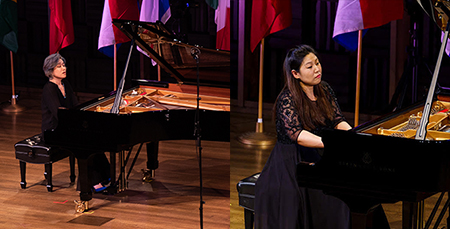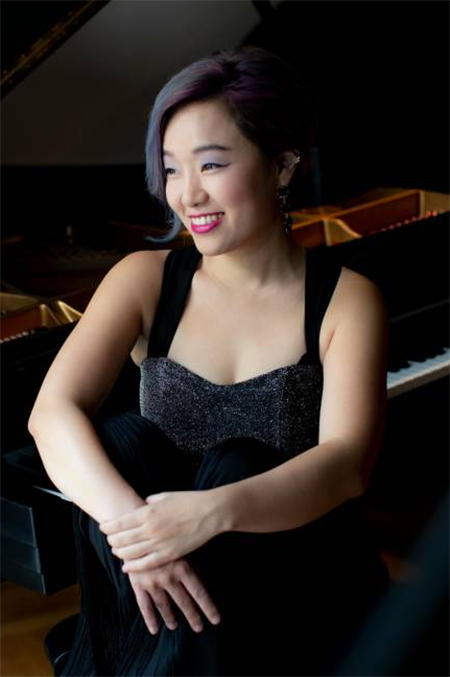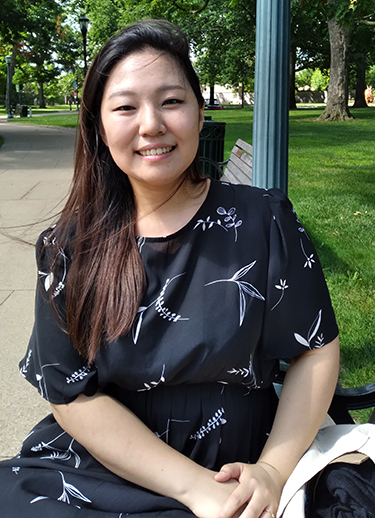by Mike Telin

The first phase is the Chamber Music Round which begins tonight at 7:00 pm in Gartner Auditorium at the Cleveland Museum of Art. Byeol Kim will join the Escher String Quartet in César Franck’s Quintet in f, followed by Yedam Kim in Robert Schumann’s Piano Quintet. Both in-person and virtual tickets are available. Click here. The second session happens on Wednesday, same time, same place.
On Monday morning the finalists were invited to select either a New York or Hamburg Steinway for their Chamber Music Rounds. The Hamburg won three to one. After their selections were made, I had the opportunity to sit down with each contestant for one-on-one conversations in Wade Oval.
All four are as engaging in person as they are onstage. Today we hear from Byeol Kim and Yedam Kim. Their responses have been edited for content and clarity.

Mike Telin: Congratulations! How does it feel to be in the final four?
Byeol Kim: Thank you — I’m very honored.
MT: Your semifinal performance was wonderful. How did you decide on the six very diverse pieces?
BK: When it comes to planning repertoire, I think everyone has a different strategy. I started competing in competitions pretty late, later than most people. Now my purpose for competing is to be able to focus on my growth, so I try to balance the compositions I feel comfortable with against new pieces. I don’t want to play comfortable pieces all of the time. And these days my interests are in minority composers.
MT: Speaking of which, Gottschalk’s The Union is an amazing piece.
BK: Everyone asks me about Gottschalk. He’s a composer I recently discovered. When we hear a folk tune from Poland or Hungary in Chopin and Liszt we always say “that’s interesting,” but when we hear an American tune we don’t have the same reaction. So I wanted to give him some credit. He’s an interesting composer and I don’t think there is a lot written about him.
MT: I was happy to see Pierre Jalbert’s Toccata on the program.
BK: I got to know him when I was at Rice. At the time I was learning toccatas by other composers and he told me that he had a toccata that was inspired by other toccatas. I got to work with him and I thought the piece was interesting so I added it to my repertoire. But playing contemporary music in competitions can be very risky.
MT: Yes it can. But the competition did require all semifinalists to play one of the commissioned popular music arrangements. Tell me your thoughts about Kurbatov’s arrangement of Bohemian Rhapsody.
BK: At the beginning of the learning process I was more focused on imitating the original. But as I spent more time with it I thought, the transcription is by a pianist, so I questioned how much of the original I should keep in my interpretation. That was the challenging part because we all know the original song and it would have been so easy to just copy it. I wanted to keep the spirit of the original but add the classical pianistic things as well.
MT: I’m not sure you’ll agree with me, but I think Alexey Kurbatov gave the interpreter plenty of opportunities to make the piece their own.
BK: Oh I agree.
MT: Another interesting addition to this year’s competition was the Duo Piano Round. How did you feel about that?
BK: I loved it! I have to be honest that when they first said there were going to be duo piano rounds, I wasn’t sure how we could pull it off in such a short amount of time. And we didn’t know who we were going to play with until we arrived — we didn’t know what edition the other person was going to use — so there were plenty of things we needed to discuss. But when we got here and found out who our partners would be, Lovre Marušić and I immediately said, “Let’s grab a coffee — let’s become friends.”
Partnership matters — it’s teamwork and the first rehearsal was just smooth. Of course there are compromises, but we just had fun. Even before we went onstage we said we’re just going to have fun.
MT: And speaking of partnerships, tomorrow night you’ll play the Franck Piano Quintet with the Escher Quartet. Why did you choose the Franck?
BK: People always think of the Schumann, Brahms, and Dvořák, but Franck is unique from those pieces. The structure is different. The Franck feels more like a string quartet plus the piano, where the others are creating harmonies together. I’m always about color — I like having fun with different colors, and the Franck is really good for that.
MT: How much rehearsal will you have with the Escher?
BK: Two hours. We rehearse tomorrow morning and then play at night. So I’ll need to be clear about what I want in the rehearsal because there won’t be time to fix everything. But I know of the Escher and look forward to playing with them.
MT: And, on Friday there’s the icing on the cake.
BK: (Laughs) I know what you’re talking about — The Cleveland Orchestra.
MT: You’re playing Tchaikovsky — it’s a well-known piece.
BK: Yes, and well-known can be risky but I’ll do my best.
MT: Are you thinking ahead to Friday?
BK: No, right now I’m only thinking about the Chamber Music Round. I played yesterday so I’m still tired. So today I’m trying to just be a little bit laid back. I’m going to do mostly brain practice.
MT: Why did you want to be a pianist?
BK: That’s always a hard question. I’ve never thought, ‘Oh, I want to become a pianist.’
To be honest, in college I couldn’t find the enthusiasm — back then I was still in Korea, and music education there is very different from here. I wasn’t interested in technical stuff — perfection — so I kind of lost my interest. But then I came to study in the States at Eastman for my masters and that changed my life. I decided okay, I want to do something with the piano. I want to do more with color — color really touches people’s hearts. So I found my passion.

Sitting down on the park bench we joke that the new greeting is — “Are you fully vaccinated?”
(Laughs) Hello, My name is Yedam Kim and I am fully vaccinated.
Mike Telin: Congratulations on getting to the finals! How does it feel?
Yedam Kim: Good! It’s like a dream. This is my second time in the States and it is so different from Paris where I live. I’ve been to San Antonio and New York and I always wanted to come back, and here I am. I’m so happy to be here.
I had to fly from Korea so when I arrived in Cleveland I was tired, but the weather is good, the conditions are good, and the other competitors are great.
MT: You made an interesting decision to play a single piece in the first round, Brahms’ Variations and Fugue on a Theme by Handel.
YK: It was a chance, but I wanted to play it because I thought that I could show so many things in my playing. Variations. Fugue. There is Brahms and the theme is by Handel, so it is both Romantic and Baroque. So I could show many things in one piece.
MT: In the Second Round your La Valse was beautiful.
YK: Thanks — it was my dissertation for my master’s diploma. It starts from nothing and grows, and you can feel the moments from the beginning of the century. And, it’s so French.
MT: You began your semifinal program with Chopin’s Polonaise-Fantaisie in A-flat. That’s an interesting piece.
YK: It is not a usual competition piece, but it makes me cry. It is one of my favorites in Chopin’s repertoire. But I think that maybe my semifinal program was too serious. The Prokofiev Sonata No. 4 is very dark and so is Chopin.
MT: We don’t hear the Prokofiev a lot.
YK: Yes, and it’s a shame that we don’t hear it more — it’s not like Nos. 6, 7, and 8.
MT: Tell me your thoughts on the inclusion of the commissioned pieces.
YK: It was different for a competition but I preferred this to some other required contemporary pieces.
Also my husband likes Queen, so when I received the scores I told him I had a choice between Mission Impossible, the Olympic Fanfare, Bohemian Rhapsody, and America, and he said, “You need to play Bohemian Rhapsody.” I did my studies as an opera coach, so I want to sing on the piano, and with the text it’s easier to get it in my body.
MT: So you did listen to the recording?
YK: Of course. I wanted to do everything like Freddie Mercury.
MT: What did you think of the arrangement?
YK: At the beginning it was impossible to play, but I practiced — a lot.
MT: Did you enjoy the Duo Piano portion?
YK: I’ve played trios and quintets but duo piano not as much. The Mozart Sonata was new to me. But yes, I had fun.
MT: And tomorrow night you’ll play the Schumann Quintet with the Escher. I understand there is not a lot of rehearsal time.
YK: The good thing is that I have played the piece — I played it from memory in a competition in Paris, and I’m sure playing it with the Escher will be great.
MT: Then on Friday you’ll play with The Cleveland Orchestra in Severance Hall.
YK: Yes, on Friday. I’m so excited.
MT: Rachmaninoff 3 — why did you choose it?
YK: It’s the piece that made me want to learn to play the piano. I heard it in Macau with my mom when I was very small. I also saw the movie Shine about David Helfgott.
So playing this piece was my objective when I started playing the piano. I played it with my school orchestra when I was eighteen. I’ve wanted to play it again but when I chose it for competitions I didn’t make it to the final round, so finally I will play it again and I am so excited.
MT: You studied opera coaching. You are a fan of opera?
YK: Yes. The opera repertoire is so wonderful and it does influence how I play the piano. Studying opera scores makes you a better musician and so does accompanying singers.
MT: When did you start playing piano?
YK: At six years old.
MT: When did you know you wanted to be a pianist?
YK: About four or five years after I started.
MT: You’ve had a good time in Cleveland?
YK: Yes, there’s so much nature and everything is so green. I have to say that these are some of the best conditions I’ve had for a competition. The dorms are good, we are free to practice every day with a Steinway, and everything is within walking distance. And the Hall has good acoustics and the pianos are wonderful.
MT: So which piano did you choose?
YK: The New York Steinway — it has the touch of the Horowitz Steinway.
Published on ClevelandClassical.com August 3, 2021.
Click here for a printable copy of this article



